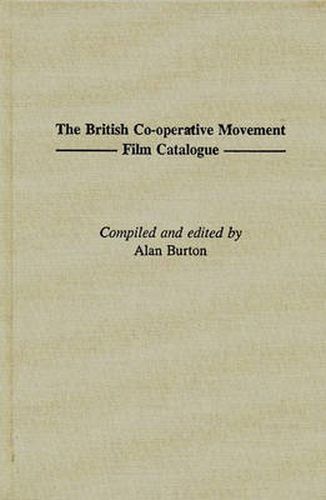Readings Newsletter
Become a Readings Member to make your shopping experience even easier.
Sign in or sign up for free!
You’re not far away from qualifying for FREE standard shipping within Australia
You’ve qualified for FREE standard shipping within Australia
The cart is loading…






The British consumer Co-operative movement pioneered the use of film for industrial and propaganda purposes. A powerful association of working-class consumers, the movement embraced the potential of cinema and used it to help articulate an ideology expounding the ideals of mutuality, equality, and democracy, and seeking to transform a capitalist society founded on individualism and selfish-help into the Co-operative Commonwealth. This book provides an extensive, detailed catalogue of more than 300 films relating to the movement. Technical details, credits, a synopsis, and historical and critical evaluations are given for each title. Numerous films, previously unknown or believed to be lost, have been traced.
The catalogue is prefaced by a substantial introductory essay which provides a contextual framework for a consideration of the movement and its use of film. The book is supplemented by a selection of articles, publications, and reports which appeared in the movement’s contemporary press, and which reveal the genuine concern to use cinema to assist in the task of making Co-operators. This catalogue will be invaluable to students of social, labor, and business history and to film and media historians who wish to broaden their knowledge of non-commercial film. It also serves as a guide for contemporary filmmakers and television researchers to this extensive collection of archive film.
$9.00 standard shipping within Australia
FREE standard shipping within Australia for orders over $100.00
Express & International shipping calculated at checkout
The British consumer Co-operative movement pioneered the use of film for industrial and propaganda purposes. A powerful association of working-class consumers, the movement embraced the potential of cinema and used it to help articulate an ideology expounding the ideals of mutuality, equality, and democracy, and seeking to transform a capitalist society founded on individualism and selfish-help into the Co-operative Commonwealth. This book provides an extensive, detailed catalogue of more than 300 films relating to the movement. Technical details, credits, a synopsis, and historical and critical evaluations are given for each title. Numerous films, previously unknown or believed to be lost, have been traced.
The catalogue is prefaced by a substantial introductory essay which provides a contextual framework for a consideration of the movement and its use of film. The book is supplemented by a selection of articles, publications, and reports which appeared in the movement’s contemporary press, and which reveal the genuine concern to use cinema to assist in the task of making Co-operators. This catalogue will be invaluable to students of social, labor, and business history and to film and media historians who wish to broaden their knowledge of non-commercial film. It also serves as a guide for contemporary filmmakers and television researchers to this extensive collection of archive film.